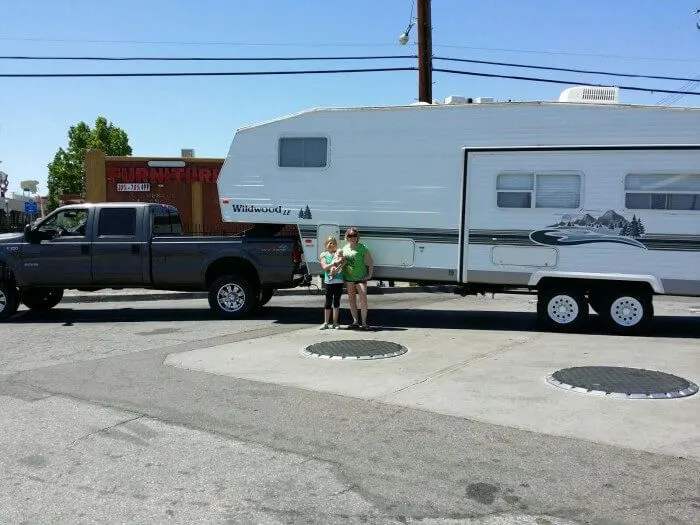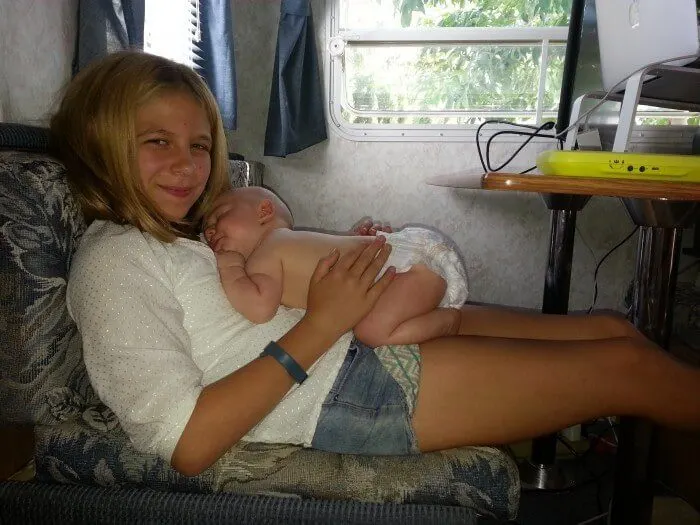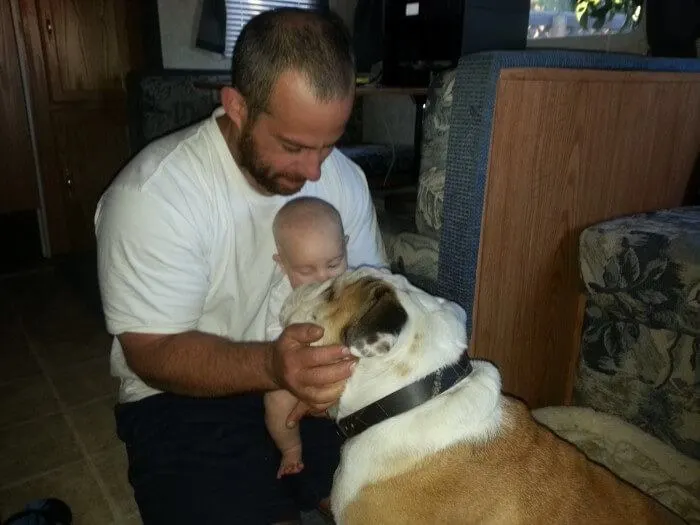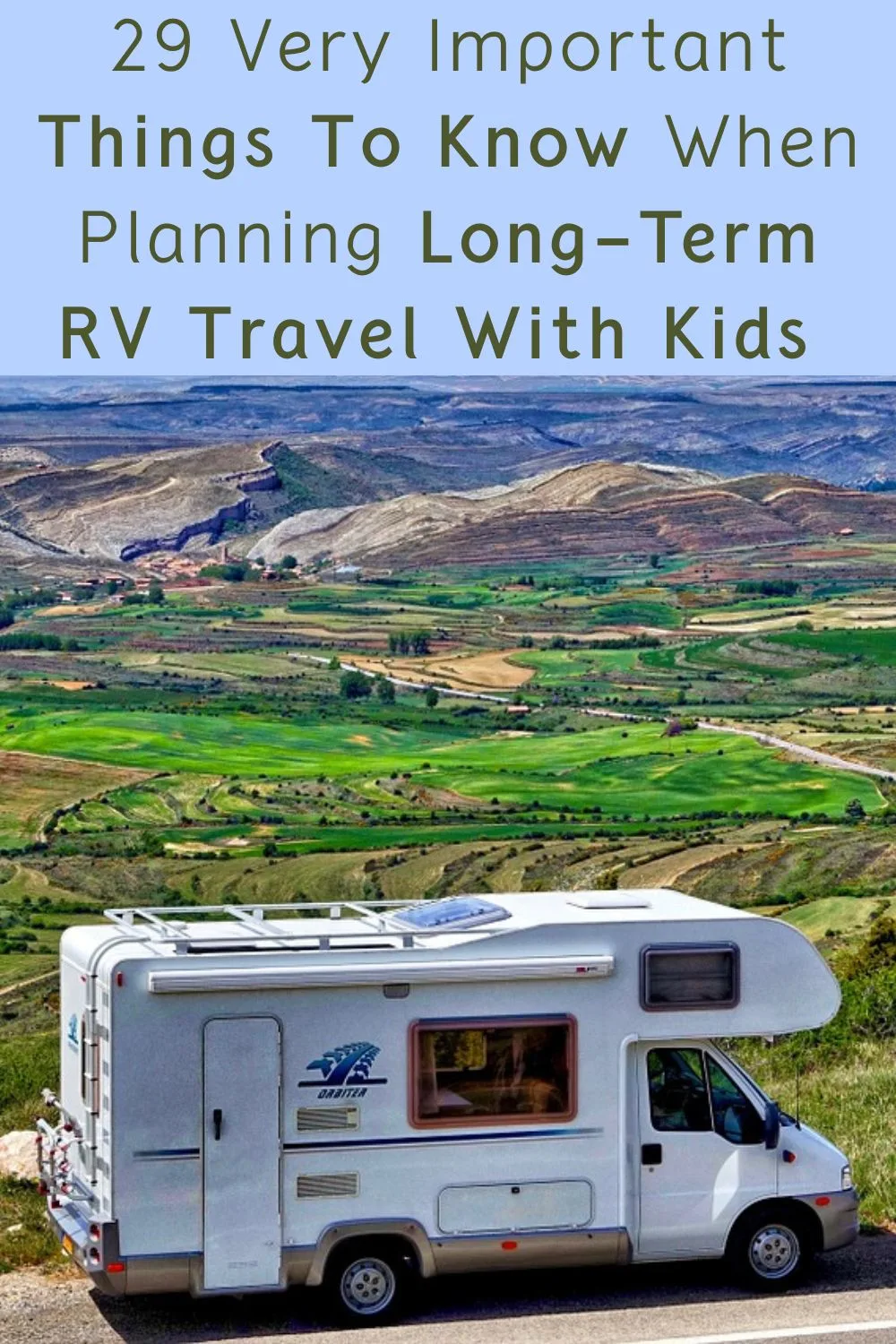This was our plan for a year of full-time RV living and traveling with two adults, a tween, a baby and two English bulldogs:
We would sell our enormous dream home in Southern California. We’d go to San Francisco in our RV and work in the city at high-paying jobs while living like paupers and stashing away all our extra earnings.
When we hit our saving target, we would hit the road, traveling to 48 states within a year on a giant RV adventure,remote schooling our tween and working sporadically as digital nomads along the way.
The first part worked like a charm. We accumulate our nest egg and hit the road.
But it turns out full-time RVing in a 31-foot rig with two English Bulldogs, a moody tween, a 3-month-old baby and a claustrophobic husband was not a good idea.
We lasted six weeks.
And the best thing I can say is that in that time we learned a lot about ourselves and our travel style.
Whether you are cotemplating trying the full-time RV life with kids for just a summer, or a year or maybe even longer, here are 29 very important things to think about and do. These are the things we wish someone had told us and I hope it helps you to complete your journey.
Read More
• Give RVing a tryout with one of these 4 Alaska Road Trips.
• Consider these 5 Reasons To Try an RV Vacation.
• Check out Dotting the Map: This family of six lived happily as RV travelingh nomads for a several years and have a welth of good advice.
29 Things To Know Before Trying Full-Time RV Living With Kids
Tips For Planning Your Trip
1. Don’t empty your emergency savings account to buy an RV and a giant diesel truck. Wait until you have a emergency fund in place. Then save for these big purchases.

2. Do practice living in an RV for a few two-week stints to see if your family can handle the tight quarters and pared-down living.
Tip: RV owners use sites like RVshare to rent their vehicles out when they aren’t using them. It’s an easy and inexpensive way to try out RVing close to home. And to sample a few kinds of RVs before you commit to buying one.
3. Don’t buy an RV that is more than ten years old. Among the many reasons this is a bad idea, some RV parks won’t let you in.
4. Do set a budget before you head out on your adventures and stick to it. Plan for unexpected expenses because when they always happen, especially at the start of your RV living, when you don’t entirely know what you’re doing.
5. Don’t try full-time nomadic living if you’re a packrat. You will not have the space for all your treasures. And your spouse and tween will roll their eyes at you when you try to bring too much with you and fail.
6. If you sell or rent your home while you’re on the road you’ll probably have to pay to put your stuff in storage. You could sell some of it, but save enough to have furniture to come home to.
7. Don’t go on the road too soon after a major life event (like, ahem, birthing a baby). Make sure your life is on an even keel, because nothing in RV life is!

8. Have a backup plan.
There might come a point where your family just wants to go home. If that happens you’ll want to have a home (or an understanding relative’s home) to go back to.
Even if you like the nomadic life, you might want to take breaks now and then, so the kids can return to home base to catch up with friends and cousins. And to keep a foot in the life you plan to return to.
9. Reserve a financial cushion to cover your expenses while you transition back to your old life when your trip is over.
Tips For Living in RV Parks
10. Don’t gossip about your neighbors in your RV. They can hear every word you say.
11 Do be prepared for unexpected creepy crawlies. Our RV was infested by field roaches at one RV park; one of the worst experiences we’ve ever had.
12. Don’t expect to grocery shop like you did while living in a regular house. Again: storage space.
Plan to go to the supermarket or farmer’s market every two or three days and to occassionally have to buy some last-minute (over-priced) items at the RV park’s store. This can make it harder to keep track of your food budget.
It also makes it harder than you would imagine to limit non-essential purchases. Kids have a hard time accepting that you can’t buy cookies as soon as you run out of them just because you’re going to the supermarket.

13. Do cancel most of your streaming subscriptions and buy a DVD player. Redbox will be your best friend when you don’t have enough bandwidth to stream movies, which will be most of the time.
14. Don’t forget your noise-canceling headphones for those days/nights when you cannot handle another raucous neighbor (or your family).
Don’t be surprised if you teen wants a set, of noise-cancelling headphones, too.
15. Young children (say, under 7) will find playmates wherever they go and are the family members most likely to like cozy RV living.
16. Tweens and teens are more likely to be homesick, crave privacy and miss their friends, school and activities.
Expect them to spend a chunk of time texting, face-timing, checking Instagram and doing other online teen stuff when you have good wi-fi. Expect them to be moody when you don’t.
Expect them to be the first ones to ask when you’re going home.
Tips for Working and Learning Remotely
17. Don’t expect a fast internet connection. They’re hard to come by, even at the campgrounds and resorts where we stayed.
18. Do look for places with free WiFi for those days when you need to do heavy online work.
Libraries are very handy. They don’t require you to fork over for a latté. And your kids can read or do homework or their own online stuff while you work.
19. Keeping your full-time job makes the financial part of this much easier. But you’ll need to figure out how and when you’ll work. There will be travel days when it’s out of the question.
Even when you’re settled in a place for a bit your remote work has to coordinate with remote school, sightseeing, activiites and general family stuff.
Absolutely work out expectations with your manager so they understand you might not keep regular work hours.
Also, you’ll want choose RV parks near sizeable towns so you can be sure of finding a spot with good wi-fi on workdays.
20. If you plan to consult or freelance, get that going before you start your trip so you have a sense of what your workload and cash flow will be.
21. If you plan to do any kind of work or run an online business, you might have to gear up quite a bit—and spend several hundred dollars—to have enough bandwidth for the road.
• Check out my list of essential travel tech items for parents.
22. Be prepared for your kids to do a few days worth of school work whenever you’re near wi-fi.
23. If you’re remote schooling rather than homeschooling, make sure your kids’ teachers fully understand what you’re doing. Explain that you might be offline for a few days at a time and discuss how that will work for both teacher and student.
Make sure your kids are comfortable with this type of schooling. For some students, routinely working ahead or playing catch up would create a lot of stress.
24. If you plan to homeschool, discuss with your partner who will teach what and what the kids will learn online or on their own. Also talk about how school work with coordinate with your work and other activities.
Also, consider how self-motivated your kids are, especially as they get to be tweens and teens. Daily nagging can make an RV seem very small very quickly
25. Get creative with your schedule. If you’re not flexible, it will be stressful to try to work and learn on the road while also seeing the sites.
Tips For Sticking To Your Plan & Completing Your Trip
26. Do plan to get out of your RV several times daily or you will go crazy.
Take a walk around the park, go to the grocery store, walk the dog– anything to get out of that tiny space.

26. Do make friends while you’re traveling, as you never know what incredible people you might meet.
Also, you’ll start to run into some families on the road over and over. You might even plan to be in the same place at the same time as a family you’ve hit it off with. These connections will help you and your kids to not feel isolated.
27. Don’t splurge. It takes time to figure out how much things really cost on the road. Live as frugally as possible until you discover where you have wiggle room and where you don’t.
28. Do try to get time away from the kids. Realize that with your children living and sleeping a few feet away from you it will be difficult to have necessary adult conversations, not to mention some occasional “romance.”
In most RV parks you’ll feel safe leaving kids above a certain age alone for an hour (that age is up to you). Take advantage of amenities like onsite cafés, bars, walking trails or saunas and whirpools to get some couple time.
29. Do remember that no matter what happens on the road, you will eventually be thankful for the experiences and the memories you’ve shared.
I don’t regret giving full-time RV life a try. And I don’t regret giving up and coming home when we we did.
I do wish we had been better prepared for this unique mode of family travel, done more planning and research and tried some practice runs. Had we known what the RV lifestyle would really be like we might have prepared better.
Then again, we might not have gone at all.
Pin it for later!

Mindi Rosser is a marketing consultant and social media strategist. After their RV adventure, she and her family settled in Hawaii.
Photos by Mindi Rosser©

